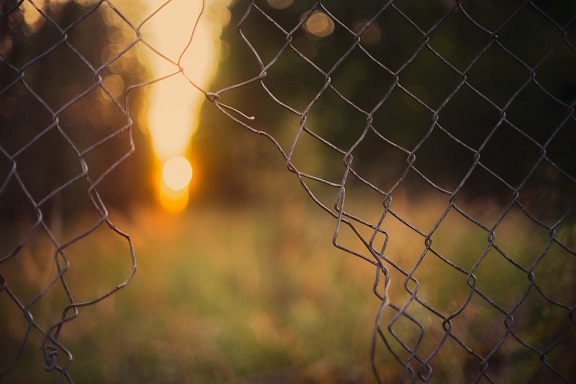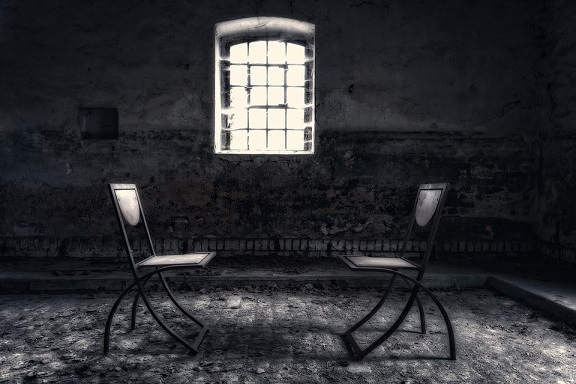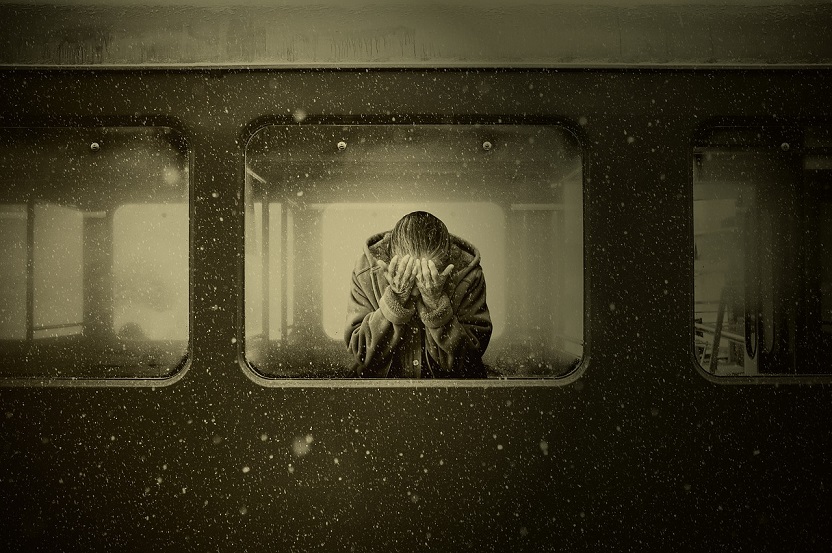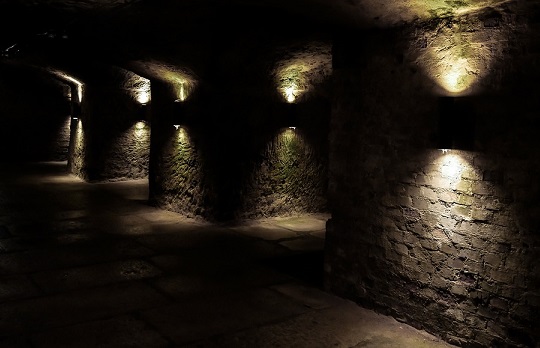This is my story. I arrived there on 14 February 2010. A day earlier, in the early morning; the police arrested me in a street in east London for carrying a knife. Yes, it was a foolish act and even though it did not lead to any physical or material harm, it did cause me and my family much unrest and distress for several days, that could easily have been avoided.
 Arthur Vandelay *
Arthur Vandelay *
That morning they drove me to the police station, very close to where I had been arrested. They took my personal details and gave me a small medical check. Before going into the jail, they removed my belt and the laces from my shoes.
I woke up around midday on a plastic mattress. The room was lit up by a fluorescent lamp and there was a toilet in the corner. I spent several hours trying to make sense of the previous night when two police officers arrived to interview me, a man and a woman. They explained the procedure to me and asked if I needed a translator. I told them that I could understand them and would make myself understood. The woman, about 45 years old, seemed nice and we chatted for a while before starting the taped declaration. I tried to explain what had happened. I believe both officers realised that I was very apologetic and that I had not been aware of the consequences that my actions were going to lead to. Before going back to the cell the policeman picked up the two recorded tapes and invited me to take one of them. He also assured me that a solicitor would be coming that afternoon to speak with me.
The solicitor never appeared and my anxiety grew as time went on. Only the shadows of passers by that were reflected under the door provided some light relief, as I felt that at least there was someone there outside. After asking several times, eventually I was able to make a phone call. In the evening the secretary at the police station revealed the charge that was being made against me: carrying a knife in a public place without good reason and he told me that at 9 o’clock the next morning I would have a trial in a London court.
 I returned to my cell aware of the seriousness of my situation, although I was not able to take everything in. That afternoon the police had ransacked my house looking for any identification documents. My stay in the police station lasted some 27 hours. The following morning they returned my confiscated belongings, the laces and the belt, the only items I possessed because during the cars night they had stolen my wallet and mobile phone. This was the reason that finally drove me to the foolish decision to ‘arm myself’ to go in search of my aggressor and recover my belongings.
I returned to my cell aware of the seriousness of my situation, although I was not able to take everything in. That afternoon the police had ransacked my house looking for any identification documents. My stay in the police station lasted some 27 hours. The following morning they returned my confiscated belongings, the laces and the belt, the only items I possessed because during the cars night they had stolen my wallet and mobile phone. This was the reason that finally drove me to the foolish decision to ‘arm myself’ to go in search of my aggressor and recover my belongings.
I became more desperate and I still do not know how I was able to sleep at night. The trial on the Monday played out with many misunderstandings, incompetence, stupidity on the part of the court-appointed solicitor and the ruthless stance of the judge with respect to the few reasons they were trying to use in support of me and with which the solicitor was trying unsuccessfully to defend me with. I recall that before the trial, I had an interview with my solicitor and I told her, amongst other things, what my address was and what I was doing in London. In spite of this, during the trial she seemed to forget all this and kept asking me, as I was sat on the court bench, for information that she already knew in detail. Given all this, the scene seemed more like something from a Samuel Beckett play, a surrealist nightmare that culminated when the judge sent me to Brixton prison, where I would be, until the following trial, three days later.
The Welcome
I remember the journey to the prison very well. The small van departed from the court in east London, and crossed Tower Bridge heading south. The journey lasted about an hour. The van had several little compartments in the back with a very narrow passage. It was impossible not to feel like a criminal.
 I was escorted by a police officer and in the compartment I felt cut off from everything; it was like a cage and through the tinted windows I could see our route from the court to Brixton. During the journey one of the prisoners did not stop complaining, shouting whilst the police just turned up the volume on the radio. It took half an hour before we could get out of the van, due to the amount of prisoners arriving that afternoon.
I was escorted by a police officer and in the compartment I felt cut off from everything; it was like a cage and through the tinted windows I could see our route from the court to Brixton. During the journey one of the prisoners did not stop complaining, shouting whilst the police just turned up the volume on the radio. It took half an hour before we could get out of the van, due to the amount of prisoners arriving that afternoon.
At the prison entrance they took a photo of me for my identity card, which they then gave me with my name and prisoner number. A police officer asked me why I was there; I replied that it was merely because of my stupidity, and he said: ‘So you are really a good boy then, is that right?’ He also asked about my religious beliefs. I told him I was catholic, but not practicing and he just said: ‘Everyone says the same thing’. After going through several questions on my medical history, they brought me my confiscated ‘belongings’: an Amber Leaf packet of tobacco, roll-ups, toilet paper, a sandal, some socks, deodorant and a piece of paper with the code for the prison telephones.
We waited some 15 minutes before going into the wing of the prison where I would be staying that night. I recall pretty clearly that this was the moment when it truly hit home that I was in prison and I have a mental picture of everything. The first person I saw was a big bloke, who looked like a hooligan. He was an English prisoner who worked in the kitchen. At dinner they gave us mashed potato with green beans and something else. I was quite hungry but the food didn’t take away the bad feelings. They started to call the new prisoners for an interview with a prison officer; one of the bosses, I guess. During the wait one of the ‘newbies‘ was with the “monkey“. He told me that he had taken drugs and needed something to calm him down. He did not stop biting his nails and seemed very anxious. After the interview they drove me to the cell. It was night-time by then.
My cellmate was from Kent, about 28 or 29 years old, and had a prison sentence for two years. He was a re-offender. He told me that they had arrested him 8 times for drug offences and driving whilst under the influence of alcohol, but it did not seem to bother him. On the contrary, he recounted his problems as if he had spent years re-offending with the aim of ending up back in jail.
However, only the following day he left the prison having just completed seven months of the sentence. I told him of my situation and he tried to put me at ease. He said that I would be out of the jail on Thursday, that they would give me a fine and community service, and that I did not have anything to worry about.
 We were watching the telly and after a while he asked me if I wanted to watch something in particular. I replied that I did not mind either way so he changed the channel and put on a documentary… on a maximum security jail in the United States.
We were watching the telly and after a while he asked me if I wanted to watch something in particular. I replied that I did not mind either way so he changed the channel and put on a documentary… on a maximum security jail in the United States.
The Induction
It was Tuesday morning. My cellmate woke up early and got ready to go to court. He took his belongings and we said our goodbyes, wishing each other luck. After spending a while awake in bed I had a wash, got dressed and smoked a cigarette. I rang the bell to find out when I was going to be able to leave the cell that morning. A ‘gob’ approached the peephole and told me that I would be going out in the afternoon and that I could only use the bell in case of emergency. It was normal for the ‘gobs’ to not really pay any attention. They always answered every question the same way: ‘tomorrow’. Around midday they brought me out of the cell to receive the induction and all the new ‘insiders’ met in a room and they explained the jail’s services that we were entitled to make use of: doctors, priests, educators etc. The employees talked about themselves and their work. I remember that there were some workers called ‘Samaritans’ who were there to help with problems of self-esteem. After this they gave us our food and in the afternoon they changed the prison wing I was in. This made me a little more desperate.
New friends
Anything new, like the transfer to the other wing, made me think that the situation was getting worse. The prisoners in my new “residence had a long spell in jail ahead of them and I established later that some of them had to stay at least another month before the following trial. I realised that the wing where I had spent the previous night had been just the welcome.
 Now I found myself with veteran prisoners, whether or not they were re-offenders, with the majority quite accustomed to life in prison. When I arrived it was ‘free time’ and prisoners took the opportunity to get some air away from the cell. Some went to the gym, others played pool or table tennis whilst some just mooched about, chatting in the cells.
Now I found myself with veteran prisoners, whether or not they were re-offenders, with the majority quite accustomed to life in prison. When I arrived it was ‘free time’ and prisoners took the opportunity to get some air away from the cell. Some went to the gym, others played pool or table tennis whilst some just mooched about, chatting in the cells.
I went in to my new cell and there was my cellmate, A.B. a Jamaican, around 30 years old although he seemed younger. He was half illiterate, as I later discovered. I was talking to another prisoner who seemed younger than me, but at the same time I could tell he was used to prison life. He asked me to sell him half of my tobacco for 50p. I did so, assuring him that I did not need the money, but he insisted.
In the end I gave in so that he would leave me in peace. I told them my story and they assured me that on Thursday I would be free. I left my key code for the prison telephones with the black youngster for him to use. Free time finished and everyone went back to their cells, but he had not given me back the piece of paper with the code on. When my cellmate realised he went to look for it. Then he told me that in prison you could not trust anybody. At 5.30pm they locked the cells until the following morning.
My cellmate lived right out in east London. He had worked as a cleaner and was very neat and tidy. I don’t know if he cleaned so much to just be hygienic, through neurosis or to keep his mind occupied with a repetitive task, so as to avoid dwelling on his miserable life. He told me that he had a wife and a kid. According to what he told me, he was in jail because his wife had reported him for domestic violence. She was said to be scared for her daughter. He assured me that it was all a lie. When we were watching television he pointed out words that he was hearing or that appeared on the screen and occasionally asked me to spell them. He was following Ramadan, because according to what he told me, he wanted to convert to Islam and read the psalms out loud.
 I met a Colombian guy who worked on the prison radio station. He passed by my cell on Tuesday afternoon and on reading my name on the door, he twigged that I spoke Spanish and became interested in my situation in the prison. He told me that if I had any problems I could come to him. It put me at ease speaking to him and his take on my story coincided with prior ones. That night they were showing a Liverpool Champions League football match on TV and later they showed extensive highlights of the Arsenal game. After losing two goals to nil, Arsenal came back to equalise and every goal the English team scored was greeted with cheering and thumping the walls from the other cells. The football helped me switch off from a little bit from the mental pressure of the prison although I still could not stop thinking about my family.
I met a Colombian guy who worked on the prison radio station. He passed by my cell on Tuesday afternoon and on reading my name on the door, he twigged that I spoke Spanish and became interested in my situation in the prison. He told me that if I had any problems I could come to him. It put me at ease speaking to him and his take on my story coincided with prior ones. That night they were showing a Liverpool Champions League football match on TV and later they showed extensive highlights of the Arsenal game. After losing two goals to nil, Arsenal came back to equalise and every goal the English team scored was greeted with cheering and thumping the walls from the other cells. The football helped me switch off from a little bit from the mental pressure of the prison although I still could not stop thinking about my family.
Seeking help
Wednesday was the last day in the prison. In the afternoon, during the break, I spoke to the Colombian chap. He asked me if I had a solicitor for the trial the next day. I told him that I did not know, that my court-approved counsel had said goodbye after the trial on Monday telling me that he might not be able to turn up on Thursday and that in this case I would be represented by another solicitor. The Colombian took my identity card from the cell door and tried to explain my situation to the prison guards. We walked around the whole wing whilst people were coming and going from the cells.
The Colombian tried to engage with the guards, but we got nowhere. On the way he pointed out to me the rooms where the Latinos in the jail were and said that if I had any problems at all I could go to them. The Colombian went off to the radio station and forgot to put the card with my name back on the cell door. Without that card I was nobody. My identity was the only thing that could get me out of there, and only that piece of paper could help me. I needed it so that on Thursday morning the guard could summon me from my cell to prepare for the trial. A while later, and thanks to my cellmate’s help, I managed to get my card back.
That afternoon A.B. helped me get some sandals and said to me: “In prison if you need anything, you have to nick it.” I showered and felt better. I also met some Cubans. During the free period I found myself flopped on the bed when a man, who seemed to be about 40, appeared at my cell door. Seeing me flat out on the bed whilst the others were taking the opportunity to enjoy being outside, he thought that I was very depressed. He told me that I could not be that way and in spite of everything I had to remain positive and that this was not the end of the world.
 As soon as he turned up he asked me to tell him why I was in jail; I explained my situation to him and he did his best to calm me down; “The likelihood is that you will be out of here on Thursday, but you need a solicitor. Take this phone, in case you have to be here for two or three months. I am sure they will get you out“. I took the phone out of courtesy, in the hope and almost convinced that I would not need it and then I asked him about his situation. He told me that he was in jail as they had caught him, and a friend, at the airport in London with 2 kilograms of cocaine.
As soon as he turned up he asked me to tell him why I was in jail; I explained my situation to him and he did his best to calm me down; “The likelihood is that you will be out of here on Thursday, but you need a solicitor. Take this phone, in case you have to be here for two or three months. I am sure they will get you out“. I took the phone out of courtesy, in the hope and almost convinced that I would not need it and then I asked him about his situation. He told me that he was in jail as they had caught him, and a friend, at the airport in London with 2 kilograms of cocaine.
His mate came in and, on learning of our conversation, said: It was this ^!£%*$!’s fault. I was party to it but I didn’t know anything about the cocaine. “I am also very worried for my family“, the first one told me. A little while later I spoke with another Colombian. He was the last person I was able speak with about my case before the trial. I was about to go to the gym, but his take on my situation threw any hopes I had out of the window. His comments angered me and sunk my spirits further. “I committed a crime like yours and I’m not going to lie to you, there are a lot of people here that do not tell the truth and you will definitely go to jail for some time”, he said to me.
On the last day in the evening I received a visit from the prison’s Muslim chaplain. He explained to me that a relative had called the prison and that I could make a phone call. He also mentioned that I could not say anything about it to my cellmate. Before returning to the cell, I felt so miserable that I tried to explain my situation to the chaplain. With a very soft and calming voice he tried to reassure me, but he guaranteed that everything depended on the judge and that he could not predict events.
 The final trial
The final trial
They woke me up at 7.30 the following morning. A.B. also woke up and wished me luck. They gathered several of us prisoners together in a room at the entrance to the prison before heading to the court, the same court which three days earlier had sent me to Brixton. Afterwards they summoned me to go through a little check and then gave me back my belongings in a plastic bag. We took the van back to the court. After a long wait in a court cell my solicitor and the barrister told me that the most likely outcome was that I would spend 8 weeks in jail, the sentence that the prosecutor demanded. The solicitor bid his farewell saying: “I’m sorry”. I just collapsed and remained alone in the room for a few minutes. Then I went back to the cell and a little while later a ‘gob’ knocked on the cell door. I had an interview with the court-approved counsel.
After a long interview in which a translator helped me, I went back to the cell a lot calmer, thinking that the report from the solicitor would assist me in getting out of there. And so it proved. The trial lasted barely 20 minutes and the judge sentenced me to 100 hours community service.
*Arthur Vandelay: this name is fictitious to protect the privacy and identity of the author of this true story.
(Translated by Matthew Dunford – matt_dunford@hotmail.com) – Photos: Pixabay












.jpg)












